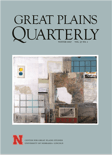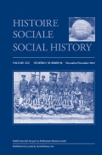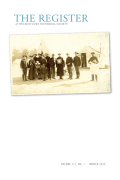
Historelo-Revista de Historia Regional y Local
Scope & Guideline
Exploring the Depths of Regional Histories
Introduction
Aims and Scopes
- Regional Histories:
The journal emphasizes the investigation of specific regional histories, providing insights into local contexts and their broader implications within national or global frameworks. - Social Movements and Cultural Identity:
A core focus is on social movements, particularly those related to marginalized groups, exploring how these movements shape cultural identities and societal structures. - Historical Methodologies:
It employs various historical methodologies, including qualitative research, archival studies, and oral histories, to present a nuanced understanding of past events. - Interdisciplinary Approaches:
The journal encourages interdisciplinary research that intersects history with sociology, anthropology, and cultural studies, thereby enriching historical discourse. - Public Health and Epidemics:
There is a significant focus on the historical analysis of public health crises and their social impacts, particularly in relation to epidemics and health policies.
Trending and Emerging
- Public Health and Epidemics:
Recent publications have increasingly addressed the historical contexts of public health crises, reflecting a growing interest in how epidemics have shaped societies and policies in Latin America. - Social Movements and Gender Studies:
There is a notable trend towards exploring social movements, particularly women's movements and gender issues, highlighting their critical role in shaping societal changes and political landscapes. - Cultural Heritage and Identity:
Emerging themes include the analysis of cultural heritage and its impact on identity formation, particularly in the context of urban development and local governance. - Intersectionality in Historical Analysis:
The journal is increasingly embracing intersectional approaches that analyze how various social categories such as race, class, and gender interact in historical contexts. - Environmental History:
There is a rising interest in environmental history, focusing on the interactions between human societies and their environments, particularly in the context of resource management and sustainability.
Declining or Waning
- Colonial Studies:
While the journal has published works related to colonial histories, there appears to be a waning focus on colonial studies in favor of more contemporary issues and their socio-political implications. - Traditional Economic History:
There is a noticeable decline in papers that focus solely on traditional economic history, such as agrarian policies or trade routes, as the journal increasingly emphasizes social and cultural dimensions of history. - Biographical Studies of Historical Figures:
Research centered around individual historical figures is becoming less common, indicating a shift towards collective narratives and broader societal themes. - Static Historical Narratives:
The journal seems to be moving away from static historical narratives that do not engage with current socio-political contexts, favoring dynamic analyses that link past and present. - Eurocentric Perspectives:
There is a diminishing presence of Eurocentric historical perspectives, with more emphasis on indigenous and local narratives that challenge traditional historiography.
Similar Journals

GREAT PLAINS QUARTERLY
Connecting History, Culture, and EnvironmentGreat Plains Quarterly is a distinguished academic journal published by the Center for Great Plains Studies at the University of Nebraska-Lincoln. This esteemed journal, with an ISSN of 0275-7664 and an E-ISSN of 2333-5092, has been a prominent platform for fostering scholarly dialogue on the cultural, historical, and environmental dynamics of the Great Plains region since its inception in 1983, with publication resuming in 1995. Although it is categorized in the Q4 quartile of Arts and Humanities (miscellaneous) for 2023, its contributions are essential for researchers, professionals, and students interested in regional studies, interdisciplinary approaches, and the unique narratives that shape the Great Plains. While the journal is not open access, it provides critical insights into the evolution of the area's socio-cultural landscapes, making it a valuable resource for those engaged in the ongoing exploration of the Great Plains and beyond.

Taller de la Historia
Exploring the Depths of Historical NarrativesTaller de la Historia is a distinguished academic journal published by the Universidad Cartagena, particularly under the Faculty of Human Sciences. With its open access model in place since 2013, this journal provides a valuable platform for researchers, professionals, and students interested in the profound and evolving narratives of history. With an emphasis on interdisciplinary approaches, Taller de la Historia aims to foster scholarly dialogue and promote innovative research that intersects with cultural studies, social history, and critical theory. By making its content freely available, the journal not only enhances accessibility but also encourages the dissemination of knowledge across a global audience. Located in Cartagena, Colombia, this journal plays a pivotal role in elevating the academic discourse surrounding historical analysis and interpretation, making it an essential resource for anyone engaged in the study of history.

HISTOIRE SOCIALE-SOCIAL HISTORY
Unveiling the Past, Shaping the FutureHISTOIRE SOCIALE-SOCIAL HISTORY, published by the HISTOIRE SOCIALE DEPT HISTORY at the University of Ottawa, stands as a pivotal resource in the fields of history, sociology, and political science. With an ISSN of 0018-2257, this Canadian journal has been contributing to academic discourse since its inception in 1976, covering a diverse range of topics that explore the social dimensions of historical events and phenomena. Although it currently holds a Q4 ranking within its categories and shows potential for growth, its committed aim is to foster scholarly dialogue and disseminate innovative research that challenges conventional narratives. With publication years converging as recently as 2024, the journal remains relevant and accessible to both seasoned researchers and emerging scholars. Its commitment to understanding the intricate connections between society and history makes it an invaluable resource for professionals and students alike, encouraging a deeper exploration of the past and its impact on contemporary issues.

Revista de Historia-Sao Paulo
Illuminating the Past, Inspiring Future Inquiry.Revista de Historia-Sao Paulo, an esteemed academic journal published by UNIV SAO PAULO, FAC FILOSOFIA LETRAS & CIENCIAS HUMANAS, has been a key platform for historical research since its inception in 1950, offering open access to a diverse array of scholarly articles. Based in Brazil, this journal delivers a critical perspective on historical studies, contributing to the broader discourse within the field. With an ISSN of 0034-8309 and an E-ISSN of 2316-9141, it has established a notable presence in academia, ranking within the Q2 quartile for its contributions to history as of 2023. The journal's impact is underscored by its inclusion in Scopus, with a rank of 1103/1760 in the Arts and Humanities category. Covering converged years that span from 1968 to 2024, the journal caters to a wide scholarly community and facilitates the dissemination of pioneering research. Its commitment to making historical resources accessible accentuates its relevance and importance to researchers, professionals, and students alike.

Historia y Memoria
Advancing Historical Scholarship with Open Access InsightsHistoria y Memoria is a prominent open access journal in the field of history, published by UNIV PEDAGOGICA & TECNOLOGICA COLOMBIA in collaboration with the INST INVESTIG & FORMACION AVANZADA. With an ISSN of 2027-5137 and E-ISSN of 2322-777X, the journal has been disseminating valuable historical research since its transition to an open access format in 2010, ensuring that scholarly work is widely accessible to researchers, professionals, and students alike. Recognized for its academic rigor, Historia y Memoria is ranked in Q2 in the History category and holds a commendable Scopus rank of #651 out of 1760 in the Arts and Humanities – History category, placing it in the 63rd percentile. The journal focuses on exploring diverse narratives and methodologies in historical research, making it an essential resource for scholars seeking to deepen their understanding of historical dynamics, especially in the Colombian context. With a commitment to fostering academic dialogue and innovation, Historia y Memoria stands as a key publication for advancing historical scholarship.

Revista Electronica de Fuentes y Archivos
Exploring the Depths of Historical InquiryRevista Electronica de Fuentes y Archivos is a distinguished academic journal dedicated to the exploration of historical sources and archival studies. Published by the CENTRO DE ESTUDIOS HISTORICOS PROF CARLOS S A SEGRETI in Cordoba, Argentina, this journal has been an open-access resource since 2010, ensuring that a diverse audience of researchers, professionals, and students can freely access valuable scholarly work. The journal aims to foster dialogue and dissemination of knowledge within the fields of history, archival science, and documentation studies, promoting interdisciplinary collaboration. With its commitment to enhancing historical inquiry and promoting best practices in archival management, Revista Electronica de Fuentes y Archivos plays a pivotal role in supporting the academic and professional development of those dedicated to the preservation and interpretation of historical records.

Revista de Historia da Sociedade e da Cultura
Exploring the Tapestry of History and CultureRevista de História da Sociedade e da Cultura is a distinguished open access journal published by UNIV COIMBRA, FAC LETRAS, dedicated to advancing the field of history. Established in 2014, this journal has become a valuable resource for researchers, professionals, and students, encouraging the critical study of social and cultural history from multiple perspectives. With an E-ISSN of 2183-8615, it remains accessible to a global audience, promoting scholarly communication and collaboration. The journal's commitment to open access since 2016 ensures that high-quality research is available to all without financial barriers. Currently ranked in the third quartile (Q3) in the category of History by Scopus, it holds an impressive position within the academic community, with a Scopus rank of #950 among 1760 journals within arts and humanities, reflecting its impact and relevance in the field. By exploring both historical methodologies and contemporary cultural issues, Revista de História da Sociedade e da Cultura aims to contribute meaningfully to scholarly discourse and foster a deeper understanding of historical contexts, making it a pivotal journal for anyone interested in the ever-evolving narratives of our past.

Revista Universitaria de Historia Militar
Fostering collaboration in the study of military history.Revista Universitaria de Historia Militar is an esteemed peer-reviewed journal dedicated to the field of military history, published by REVISTA UNIV HISTORIA MILITAR in Cádiz, Spain. Since its establishment, the journal has embraced an Open Access policy since 2012, facilitating greater dissemination of knowledge and enabling researchers, professionals, and students to access cutting-edge research without subscription barriers. With a commitment to advancing the understanding of military history through empirical research, theoretical frameworks, and interdisciplinary analyses, Revista Universitaria de Historia Militar serves as a vital platform for scholars to share their findings and contribute to the evolving discourse in this dynamic field. The journal's rigorous editorial standards and global reach underscore its significance in fostering academic collaboration and promoting insightful discussions on historical military events, strategies, and their socio-political implications.

Register of the Kentucky Historical Society
Unveiling the Layers of Kentucky's Rich Heritage.The Register of the Kentucky Historical Society is a prestigious journal dedicated to the exploration and documentation of Kentucky's rich historical narrative and cultural heritage. Published by the Kentucky Historical Society, this journal serves as a vital resource for scholars, historians, and enthusiasts engaged in the study of regional history. Although it does not operate under an open access model, it upholds a rigorous approach to academic standards, ensuring high-quality peer-reviewed content. With its ISSN 0023-0243 for print and 2161-0355 for electronic formats, the journal provides a platform for original research articles, critical essays, and book reviews that contribute significantly to the academic discourse regarding Kentucky's history. By prioritizing comprehensive scholarship on the state's past, the Register plays an essential role in fostering a deeper understanding of local heritage, offering invaluable insights to researchers, professionals, and students alike.

Vestnik Tomskogo Gosudarstvennogo Universiteta Istoriya-Tomsk State University Journal of History
Fostering Scholarly Dialogue in Historical StudiesVestnik Tomskogo Gosudarstvennogo Universiteta Istoriya - Tomsk State University Journal of History is a prominent academic journal that focuses on advancing the field of historical studies with a particular emphasis on Russian and Siberian historiography. Published by TOMSK STATE UNIVERSITY, this journal aims to provide a platform for the dissemination of innovative research, critical analyses, and scholarly discussions among historians, researchers, and students. With its ISSN 1998-8613 and E-ISSN 2311-2387, the journal is committed to fostering an accessible scholarly community, although it currently does not operate under an Open Access model. By featuring works that engage with various narratives and methodologies, Vestnik Tomskogo Gosudarstvennogo Universiteta Istoriya plays a vital role in enriching academic dialogue and contributing to the ever-evolving understanding of historical contexts, particularly in relation to regional studies. This journal is an essential resource for anyone interested in delving into the complexities of history, culture, and society.